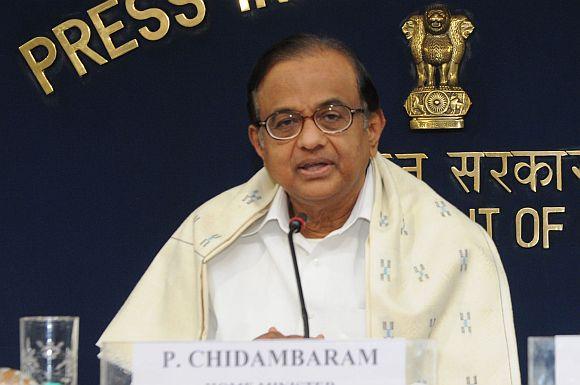
A powerful, intelligent man with prime ministerial ambitions is in deep trouble.
Union Home Minister P Chidambaram's role in the Aircel-Maxis telecom deal has been sharply questioned by Bharatiya Janata Party leader Arun Jaitley in the Rajya Sabha.
On Monday, May 14, Chidambaram defended himself and his son Karti emotionally. Chidambaram reiterates that neither he nor his family members 'had any equity at any time indirectly or directly or have any investment in any telecom company, including Aircel or Maxis.'
A normally unemotional Chidambaram went to the extent to say 'It would be much simpler if somebody took a dagger and plunged it into my heart rather than questioning my integrity.'
Jaitley, a lawyer, responded to his 20-year-old-lawyer colleague that 'Our concern is not to plunge a dagger in somebody's heart, the purity and fairness of government should be maintained.'
Is Chidambaram in serious trouble? What is the alleged Aircel-Maxis scam? What is Chidambaram and his son's alleged role in it?
We shed some light on the controversial issue.
What is the Aircel-Maxis deal?
Maxis is a Malaysian company owned by business tycoon T Ananda Krishnan, popularly known as TAK. He is a Malaysian citizen of Sri Lankan Tamil origin.
Aircel was first promoted by NRI tycoon C Sivasankaran (Siva), a native of Tamil Nadu.
In 2006, Maxis took over Aircel by acquiring 74 per cent shares. The rest (26 percent) is now owned by Indian companies related to the Apollo Hospital group. These shares are managed by Sunita Reddy, one of Apollo group founder Dr C Pratap Reddy's daughters.
This deal became controversial after the 2G spectrum scam when the Supreme Court asked the Central Bureau of Investigation to probe then telecom minister A Raja's predecessors.
Please ...
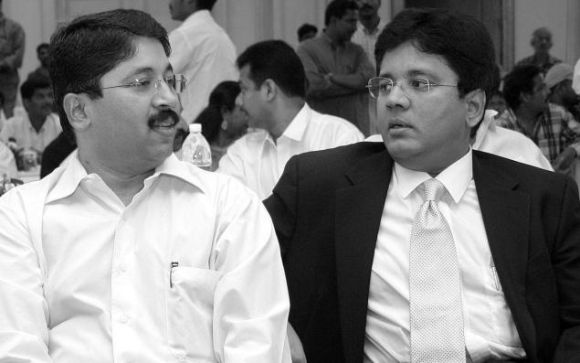
In April 2011, Siva complained to the CBI that he was arm-twisted by the previous telecom minister, Dayanidhi Maran, to sell his Aircel stake to Maxis.
Maran resigned from the Union Cabinet in mid-2011 after the CBI reported 'some element of coercion' on the Aircel-Maxis deal.
The CBI has now registered an First Information Report naming Maran and his elder brother Kalanidhi Maran, who controls the Sun TV network, Maxis owner Ananda Krishnan and CEO Ralph Marshal, who is also of Sri Lankan Tamil origin, having Canadian citizenship.
The CBI FIR accuses the Maran brothers of quid pro quo for facilitating the deal for Maxis.
According to the FIR, the media company Astro, belong to the Maxis Group, had invested around Rs 600 crore (Rs 6 billion) in a Sun network venture in 2007.
The heat is now on Chidambaram after Janata Party President Dr Subramanian Swamy revealed financial transactions between companies 'controlled' by the home minister's son Karti and Siva.
Please ...

What is P Chidambaram's alleged role?
At a press conference in New Delhi on April 26, Dr Swamy released a set of documents related to Karti Chidambaram 'controlled companies.' Karti owned more than 94 per cent shares in a company called Ausbridge Holdings and Investments Private Limited.
Karti resigned from the company a few days after Dr Swamy revealed the 12 companies where he was a director. The sudden resignation from Ausbridge tempted Dr Swamy to dig further.
Ausbrdige owns 67 percent shares in another company -- Advantage Strategic Consulting Private Limited. According to its old balance sheet, before March 31, 2006, it had given Rs 26 lakh (Rs 2.6 million) as loans and advances to Siva's Aircel Televenture Ltd.
Those days this company held two mobile phone service providing companies -- Aircel Ltd and Aircel Cellular Ltd.
This transaction took place during the period when the Foreign Investment Promotion Board, which reported to Chidambaram, then India's finance minister, was processing the Aircel-Maxis deal.
Dr Swamy alleges this was a payment by 'Karti-controlled Advantage to acquire five percent shares in Siva's Aircel Televenture, which received around Rs 4,000 crore (Rs 40 billion) from Maxis.'
He further alleged then finance minister Chidambaram delayed the clearance till his son received shares in Siva's company, which pocketed the Malaysian investment.
Please ...
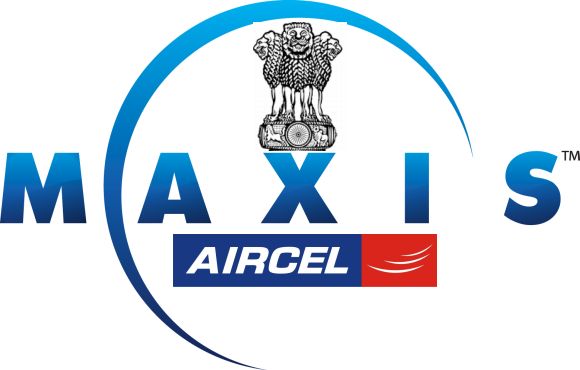
Reacting to Dr Swamy's allegations, two days later, the finance ministry said there was no delay on Chidamabaram's part to clear the deal.
The government said the FIPB meeting chaired by Chidambaram cleared the Maxis investment of 74 percent shares in Aircel on March 7, 2006.
The approval was for enhancing 26 percent shares to 74 percent in Aircel. The government said Maxis, through its Mauritius-based subsidiary Global Communication Services Holding Ltd, acquired Aircel.
But the FIPB records say otherwise. According to it, item No: 7 of the FIPB meeting approved one Century Telephone from US and Rediongton Pte Ltd from Singapore to acquire 74 percent in Aircel and approval was for enhancing 49 percent shares to 74 percent.
The value of foreign investment was shown as just Rs 180 lakh (Rs 18 million).
Another FIPB meeting on October 3, 2006 says (as item No: 15 and 16) the government approved GCSHL to acquire 74 percent in Aircel and its associate company Dishnet.
Interestingly, there was no mention about the value of the foreign investment. Now the government says there were two approvals and the second approval (October 3, 2006) was an approval for downstream investment.
Another controversy is that Maxis declared to the Malaysian Stock Exchange that it had acquired 99.7 percent shares in Aircel. This is a clear violation of Indian law.
According to Indian law, the maximum permissible level of foreign investment in the telecom sector is 74 percent.
There is another controversy over the huge variation of price in shares allotted to the Apollo Hospitals group, comparing the price of shares allotted to Maxis.
On these two issues, Chidambaram told the Rajya Sabha: 'The law will take its course.' He denied all allegations against him and his son.
Please ...
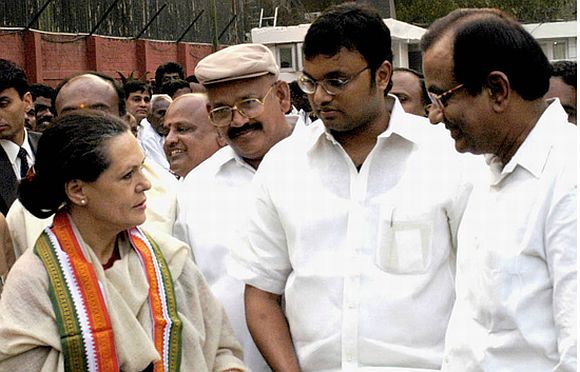
How much money travelled to and from Karti Chidambaram's bank accounts?
Advantage (controlled by Karti's Ausbridge) paid Rs 26 lakh (Rs 2.6 million) to Siva's Aircel Televenture before March 31, 2006. No specified date of transaction is available.
P Chidambaram said during 2006, Advantage was not controlled by Karti's Ausbridge. But BJP MP Arun Jaitley countered this argument by producing documents showing that the same e-mail IDs were used by both companies.
Chidambaram's argument in the Rajya Sabha was that this payment was related to 'some consultancy services.' Opposition MPs countered that the payment is shown as loans and advances by Karti's company to Siva's company.
The MPs claimed Karti had paid money to subscribe to shares in Siva's company, terming the FIPB clearances as a dubious one.
Dr Swamy alleged that there was a corresponding share increase in Siva's balance-sheets, after it received money from Karti-controlled Advantage.
What is the link between Dayanidhi Maran and Karti Chidambaram?
Maran was telecom minister and Karti's father was finance minister when this controversial deal took place.
Please ...
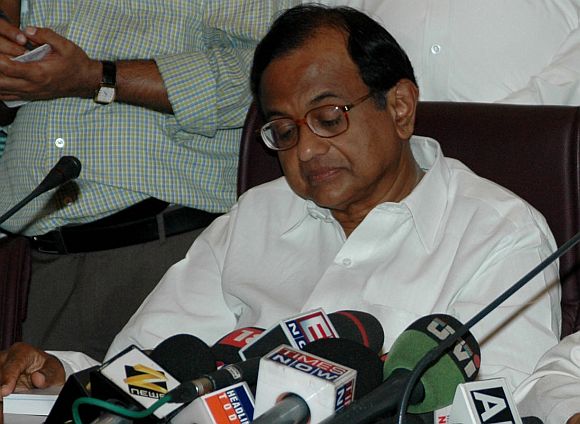
What are the grey areas in Dr Swamy's allegations?
Dr Swamy produced documents accessed from the Registrar of Companies which shows Karti-controlled company Advantage's payment of Rs 26 lakh (Rs 2.6 million) as loans and advances to Siva's Aircel Televentures.
Dr Swamy has not produced documents to prove that Advantage received shares from Siva's company.
This financial transaction occurred when the file on the Aircel-Maxis deal were pending with the FIPB, reporting to Chidambaram, then India's finance minister.
This can be prima facie evidence, considering the violations, illegalities in the FIPB clearance.
It is not the job of Dr Swamy or the Opposition parties to prove or provide all set of documents. The exact financial transactions and motives can only be proved through a CBI or Enforcement Directorate probe.
The FIR has been already registered, so it is not difficult for the government to investigate Dr Swamy's allegations against Chidambaram.
The government has not yet issued a satisfactory response on the FIPB approval controversy.
How the CBI or ED can probe a matter alleged to have the home minister's alleged involvement is a different question.
What will happen next?
The Opposition is not satisfied with the government's replies on this regard.
On July 17, the Supreme Court will hear the case filed by Dr Swamy. His main demand is that the CBI should probe Chidambaram's role in the approval of the Aircel-Maxis deal. He alleged that the CBI probe is only limited to the Marans in the Aircel-Maxis scam and that is not enough for a fair trial.
This FAQ was created with inputs from investigative reporter J Gopikrishnan
...
...